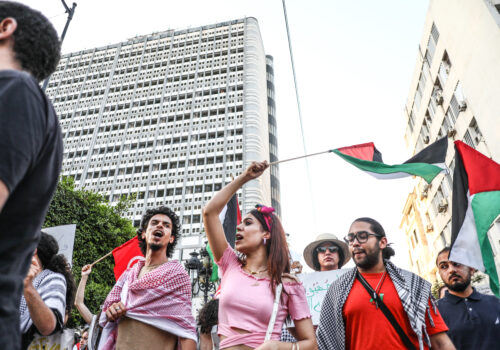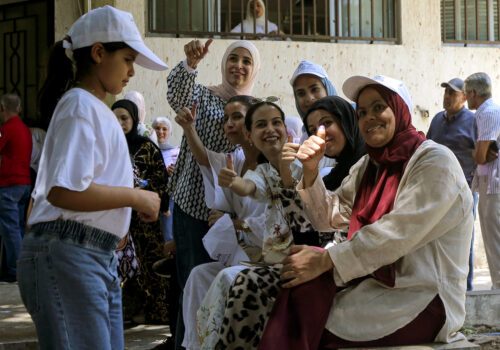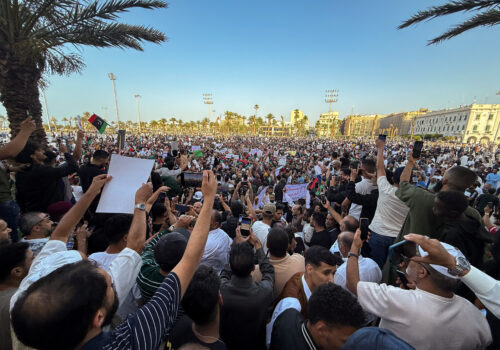How the war in Gaza diminished dreams of political reform in Egypt
In early 2023, Egypt’s deeply constrained public sphere showed tentative signs of political opening. Confronted with an economic crisis, President Abdel Fattah al-Sisi, who has maintained tight control over the country since 2014, initiated a package of economic and political reforms. Pushed to the margins for years, opposition voices cautiously hoped that the 2023 presidential and August 2025 parliamentary elections might open limited new space of political participation for secular groups after years of political constraints. Then came the October 7, 2023 Hamas attack inside Israel.
With the launch of Israel’s ongoing war in Gaza, followed by escalation with Hezbollah and Iran, harrowing images from the strip, and fears of Palestinian displacement to Egypt—Egyptian anxiety is elevated, and the national debate has shifted from reform to national security. By the end of 2023, al-Sisi had secured a third term without a meaningful electoral contestation amid calls for national unity.
It’s clear that the post-October 7 era has not only devastated the Gaza strip, it has also influenced Egypt’s economy and domestic political dynamics—and the impacts extend beyond the ballot box. This includes deepening ideological fractures among Egypt’s intellectuals and secular opposition, further discrediting their democratic narrative while lending credibility to conspiracy theories, and restoring the battered image of Egypt’s military as the nation’s ultimate protector.
Displacement overshadows political reform
After years of mismanagement, Egypt faced an economic crisis between 2022 and early 2023. Inflation climbed to over 32 percent by March 2023, and foreign debt exceeded $160 billion. These pressures created a narrow opening for discussions about political and economic reform and the military’s expanding role in the Egyptian economy.
To mitigate domestic discontent and reassure international donors, al-Sisi announced a “National Dialogue,” launched in May 2023. The dialogue was officially framed as a platform to promote political reform and to gather input from the full political spectrum, except the banned Muslim Brotherhood, on the country’s economic and governance challenges. Moreover, the government released several secular political prisoners, allowed the return of some exiled dissidents, permitted media space for opposition, and lifted the asset freeze and travel ban imposed on many human rights defenders. The “State Ownership Policy Document,” issued and approved in December 2022, pledged a timeline to reduce the state’s dominance over key economic sectors.
These steps raised some hopes that the 2023 presidential and 2025 parliamentary elections would differ from previous ones, where al-Sisi won 97 percent of the vote and state allies dominated parliament. They also raised the expectation that the state would allow greater participation for secular opposition, tolerate more serious candidates to compete with al-Sisi, allow for the opposition to form independent electoral lists, or at least guarantee broader inclusion within state-approved electoral lists in the coming parliamentary election. Egypt’s drained intellectuals and opposition groups, still recovering from the failures of the post-2011 uprising hoped for a modest revival of political dynamism after years of exclusion under al-Sisi.
Yet, the outbreak of the Gaza war abruptly shifted the national discourse, and the debate of political reform quickly faded behind the war’s horrific scenes, along with debates over plans to displace Palestinians to Egypt and Jordan. Amid public anxiety, Egypt’s December 2023 presidential election passed largely unnoticed and without serious competition. Al-Sisi secured a third term with an overwhelming majority, with 89.6 percent this time, facing only nominal opposition, calling his victory a “rejection of the inhumane war in Gaza.”
Even the conviction and imprisonment of former Member of Parliament Ahmed Tantawi—who had sought to run for president—for possessing and distributing unauthorized election documents sparked far less public debate than expected. With parliamentary elections expected by within weeks, there is little meaningful discussion of electoral reform or the measures that guarantee free elections, especially after a new amendment to the election law was hastily passed in parliament. and approved by the president without serious public debate or political consensus with opposition. Many fear the parliamentary election will merely echo the presidential election’s non-competitive and tightly controlled nature.
Polarizing the polarized intellectuals
Since 2011, Egypt’s intellectuals have been divided along multiple fault lines—first between reformists and revolutionaries, then between Islamists and secularists. These divisions sharpened during the brief presidency of Mohamed Morsi, a senior Muslim Brotherhood figure, and deepened after his 2013 ouster, backed by many secular groups and the military. The ensuing economic deterioration, coupled with the shattered dream of democratization, have disillusioned most of the Egyptian intellectuals despite their differences.
More recently, however, mounting economic hardship and the failure of the post 2011-2013 political trajectories have begun to soften these ideological rifts, creating space for some intellectuals and opposition figures to reflect and publicly reassess a decade of political failures. Yet the conflict in the region has reopened old wounds, turning debates over the conflict into a new arena for polarization.
SIGN UP FOR THIS WEEK IN THE MIDEAST NEWSLETTER
Many Islamists, leftists, and Nasserist figures voiced strong support for both Hamas’s and Iran’s responses to the recent US-Israel strikes on Tehran’s nuclear facilities, framing Hamas and Iran as legitimate anti-colonial resistance forces. In contrast, many nationalists and liberal figures condemned Hamas, blaming it for derailing the Israeli peace process in the nineties and portraying the October 7 attack as reckless and damaging to the Palestinian cause. Nationalists and liberals have also accused Iran of destabilizing the region through its proxies and irresponsible actions.
Ultimately, what began as debates over Hamas’s strategy and its outcome soon escalated into media confrontations, accusations of treason, and ruptured ties within the intellectual class. In an already drained political landscape, the resurgence of these fractures deepened weakness within Egypt’s intellectuals and opposition.
Discrediting democracy and embracing conspiracy
The Gaza war’s impact went beyond political actors and debates, shaking the cultural foundations of Egypt’s reform movement. The inability of the Western-led international community to halt the scale of suffering in Gaza served as a second major blow to the liberal democratic narratives that were embraced by many Egyptian intellectuals since the 1990s, including the framing of democracy a prelude for development, peace, and progress.
In Egypt, perceived Western double standards deepened public skepticism towards democracy, increasingly seen not as a normative framework for foreign policies but as a tool of political pressure primarily serving Western interests. Many Egyptians were reminded of the US decision to freeze military aid to Egypt in 2013 over human rights concerns—after the Egyptian Army ousted Morsi. For some Egyptians, the human rights violations committed by their governments since 2013—which once drew US sanctions—now pale in comparison to the international accusations of genocide committed by Israel in Gaza, which the West met with outright support or passive silence. That inconsistency was also apparent in Washington’s decision to launch strikes on Iranian targets linked to its nuclear program, while continuing to support Israel—a state widely believed to possess a nuclear arsenal.
The agenda of Palestinian displacement abroad—once dismissed during the 1990s and 2000s as a conspiracy theory amplifying a fringe agenda in Israel—now appears real as Israel and the United States publicly pushed proposals to export the Gaza crisis into Egypt.
This is not the first instance in Egypt’s recent political history where Egypt’s versions of a liberal peace narrative have faced a popular reckoning. The first came when the 2011 Arab uprisings devolved into civil wars rather than democracy. And now, conspiracy theories that framed those uprisings as a Western plot to divide Arab countries and ensure Israel’s regional supremacy are experiencing a revival.
Amid these dynamics, the image of Egypt’s army and president—previously tarnished by widespread socioeconomic suffering—began to recover. The military has once again emerged as the ultimate protector with current and past traumas colliding: memories of the Sinai insurgency and post-June 2013 terrorist attacks, the enduring conflicts in neighboring Sudan and Gaza, and now Israel seizing control of the Rafah crossing. The Egyptian troop presence in Sinai, al-Sisi’s public rejection of US President Donald Trump’s plan to displace Palestinians from Gaza and his refusal to meet Trump at the White House, as well as widespread media calls to rally behind the state amid a national security threat all reinforce this image.
By strengthening the image of the army and the president, while weakening Egyptian dissidents through polarization and discrediting their democratic narrative, the Gaza war further enhanced the asymmetry between a strong, entrenched authority and a weak, fragmented opposition and intellectuals. This growing imbalance continues to block any meaningful change in power dynamics.
Al-Sisi’s security concerns
Despite al-Sisi’s renewed confidence in his restored image, and state media calls for national unity, his persistent security concerns remain.
The Palestinian cause has historically been a potent mobilizing force against the Egyptian authority, frequently harnessed by political Islamist movements like the Muslim Brotherhood, whose formal political role al-Sisi dismantled in 2013. Yet while the Brotherhood’s organizational presence has been curbed, its narrative over the conflict—alongside that of the broader “resistance camp”—may resonate with some of the Egyptian public, particularly among a younger generation that came of age during one of the most violent phases of the Arab-Israeli conflict. Many in this cohort are disillusioned with prospects for peace and increasingly receptive to boycott campaigns, championed by Muslim Brotherhood media, against Israel and the United States. They are also exposed to narratives framing the Egyptian regime as a complicit actor aligned with Western interests and Israel’s war in Gaza. The appeal of these narratives, coupled with rising sympathy for Hamas in the early months of the war and the resurgence of Islamism in neighboring Jordan—as seen in the September 2024 elections—has likely deepened al-Sisi’s anxieties. Although there is no immediate sign of large-scale pro-Palestine mobilization, due to the state’s zero-tolerance to demonstrations, these dynamics raise the risk of rekindling ideological currents viewing them as potential challenges to its stability.
Ultimately, the post-October 7 era has not only demolished Gaza. It also disrupted Egypt’s fragile political opening: deepening polarization, weakening opposition forces, and temporarily consolidating the public standing of the president and military amid heightened insecurity. The erosion of the foundations of democratic narratives, widening fractures among intellectuals, and the simmering threat of Islamist mobilization leave Egypt’s political opening increasingly elusive, with the country seemingly sliding back into political stagnation.
Whether Egypt can resist these turbulent crosscurrents—reshaped by the regional war—without sliding again into stagnation, or revive its reform ambitions, remains the defining challenge in the post-October 7 era—one that the parliamentary elections are likely to reveal.
Amr Salah Mohamed is a scholar and lecturer at the Carter School for Peace and Conflict Resolution at George Mason University, specializing in conflicts in the Middle East and Egyptian politics.
Further reading
Fri, Jun 20, 2025
Inside Cairo’s ‘security first’ calculus on the March to Gaza
MENASource By Shahira Amin
Egypt's deterrence of the march are baffling to many, because the international initiative is in line with Egypt's declared position on Gaza.
Wed, Jun 4, 2025
What Lebanon’s municipal election results mean for Hezbollah
MENASource By David Daoud
Municipal election results did not demonstrate the militant group’s dominance over Lebanon’s Shiites, but Hezbollah nevertheless retains popularity.
Tue, May 27, 2025
Beyond ceasefires: Reimagining stability and engagement in Libya
MENASource By
With all major political institutions mired in crisis, a renewed approach to peace enforcement is pivotal to building stability.
Image: People hold posters of Egyptian President Abdel-Fattah el-Sisi to celebrate his re-election win. El-Sisi secured a third term in office after receiving 89.6% of the vote in last week's election, the National Election Authority says.


